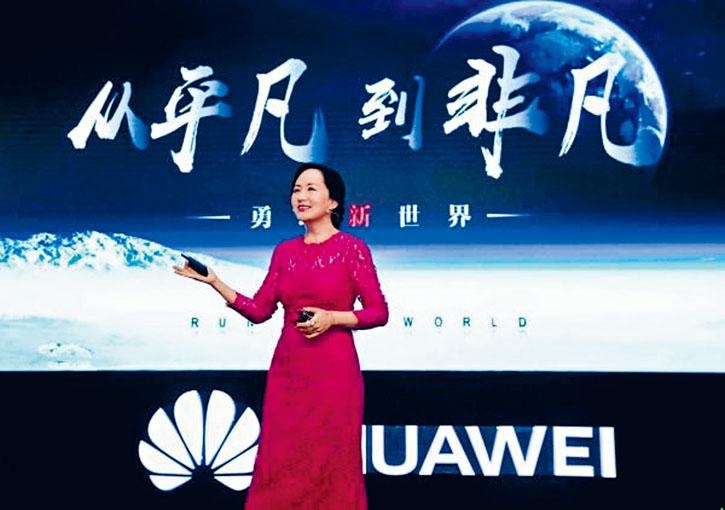
Wanzhou was arrested in Canada after being charged with violating the U.S. export ban on Iran.
(Sing Tao Daily reported) When China and the United States resumed trade talks, Meng Wanzhou, the vice chairman and chief financial officer of the mainland technology giant Huawei Group, was arrested in Canada. The United States requested her extradition. Hong Kong time this morning attended in VancouverBail hearing in court.It is reported that Meng Wanzhou's arrest is the result of a U.S. investigation into her alleged use of HSBC to evade U.S. sanctions on Iran, and HSBC's federally appointed watchdog reported suspicious transactions to Huawei accounts to prosecutors.National Security Adviser John Bolton confirmed he had prior knowledge of the arrests.As for whether the Chinese and US leaders knew about it before the dinner, there are different opinions in the media. Meng Wanzhou, the daughter of Huawei founder Ren Zhengfei, was arrested in Canada on the 1st of this month (the day when the Chinese and US leaders met) for allegedly violating the US export ban on Iran.The news shook global stock markets as investors worried about an escalation of the U.S.-China trade war.The Wall Street Journal described this as a sign that the technological confrontation between China and the United States has entered a more intense stage, and will further prompt US allies to draw a line with Huawei. The Ministry of Justice of Canada stated that it took action at the request of the United States and may extradite her to the United States. A bail hearing was held in a Vancouver court early this morning Hong Kong time."You need a lot of information and evidence to support release from detention," said Vancouver-based immigration lawyer Richard Kurland.He said that if there is no ruling on bail, Meng Wanzhou is expected to remain in detention. Reuters reported that Meng Wanzhou's arrest was part of a U.S. investigation into her alleged use of the global banking system to evade U.S. sanctions on Iran.The U.S. has been investigating whether Huawei has violated U.S. sanctions against Iran since at least 2016, and the most recent investigations include Huawei's use of HSBC Holdings to carry out related illegal transactions. HSBC paid $1.92 billion in 2012 to a deferred prosecution agreement with the Brooklyn U.S. Attorney's Office for violating U.S. sanctions and money laundering laws.The Wall Street Journal quoted sources as saying that Exiger, an external watchdog responsible for evaluating HSBC's anti-money laundering and sanctions management practices in recent years, submitted information related to the Huawei transaction to federal prosecutors in the Eastern District of New York. At the press conference of the Chinese Ministry of Foreign Affairs yesterday, some media asked about Meng Wanzhou's nationality. Spokesperson Geng Shuang said that it is clear that according to the Chinese Nationality Law, Meng Wanzhou is a Chinese citizen.The day before yesterday, when asked whether Meng Wanzhou held a Canadian passport, Geng Shuang said that he "cannot discuss the details of this case here." Did China know about this before the Xi-Trump meeting?Geng Shuang did not answer directly, but said that China provided consular assistance to the parties as soon as they learned of the relevant situation, and lodged solemn representations with Canada and the United States, demanding the immediate release of the detainees, and earnestly safeguarding the lawful and legitimate rights of the parties.rights and interests. Huawei is China's largest supplier of communication equipment and solutions, and has a leading position in the fifth-generation communication technology (5G).In addition to preventing Huawei's mobile phones from entering the US market, Washington also asked allies such as Canada, Australia, and the United Kingdom to abandon Huawei's 5G technology.According to Japanese media reports, in order to ensure network security, the Japanese government is considering banning the purchase of Huawei and ZTE products. The Japanese government will hold an inter-ministerial meeting on the 10th as soon as possible. Foreign Ministry Spokesperson Geng Shuang responded yesterday, expressing serious concern about relevant reports and hoping that Japan will provide a level playing field for Chinese companies operating in Japan.Huawei sent a letter to its global suppliers the day before yesterday stating that "it will not change its cooperation with global supply chain partners because of the unreasonableness of the US government."



